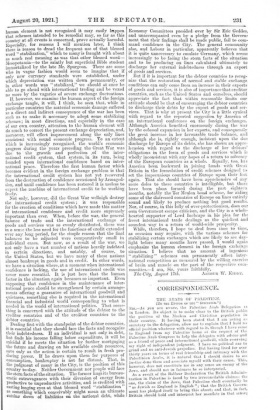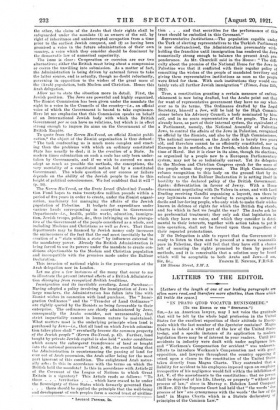CORRESPONDENCE.
THE ARABS OF PALESTINE.
[To TEE EDITOR OF TEE SPECTATOR."] Sia,—As you are aware, the Palestine Arab Delegation is in London. Its object is to make clear to the British public the position of the Moslem and Christian population in their country. It having been stated that I am acting a-, secretary to the delegation, allow use to explain that I hold no official position whatever with regard to it, though I have come to England from my Palestine home at the request of the Palestine Arab Congress to help the delegates with advice and as a friend of peace and international goodwill, while reserving my right of independent judgment. I have no political axe to grind and no anti-Jewish prejudice. But having lived for over thirty years on terms of real friendship and intimacy with the Palestinian Arabs, it is natural that I should desire to see justice done them and associate myself with their cause. This, however, does not constitute me in any sense an enemy of the Jews, and should not in fairness be so interpreted. As a result of the Balfour Declaration the British Adminis- tration in Palestine is faced by two irreconcilable claims: the one, the claim of the Jews, that Palestine shall eventually be "as Jewish as England is English "; that the British Govern- ment has pledged itself to bring this about; and that, in fact, Britain should hold and interpret her mandate in that sense;
the other, the claim of the Arabs that their rights shall be safeguarded under the mandate (1) as owners of the soil, by right of inheritance and uninterrupted occupation from a time prior to the earliest Jewish conquest, and (2) as having been promised a voice in the future administration of their own country, a voice which they consider should be dominant by the democratic law of numerical superiority.
The issue is clear : Co-operation or coercion are our two alternatives; either the British must bring about a compromise or coerce the unwilling into submission. As a matter of fact, the Administration is being driven by external forces to take the latter course, and is actually, though no doubt reluctantly, governing in opposition to the wishes of the great mass of the (Arab) population, both Moslem and Christian. Hence this Arab delegation.
Allow me to state the situation more in detail. First, the Jewish position. The Jews are powerful and highly organized. The Zionist Commission has been given under the mandate the right to a voice in the Councils of the country—i.e., an official voice of which the Government is bound to take cognizance. Here let me emphasize that this Commission speaks on behalf of an International Jewish body with which the British Government per se can have no relations, but which is in effect strong enough to impose its aims on the Government of the British Empire.
To quote from the Keren Ha-Yesod, an official Zionist publi- cation,* the object of the Zionist organization is thus defined : " The task confronting us is much more complex and exact- ing than the problems with which an ordinary constituted State has usually to deal; it is the creation of a State. In modern times colonization on such a scale has only been under- taken by Governments, and if we wish to succeed we must adopt as much as possible the methods, the conceptions, the very mentality of a constituted nation led by a constituted Government. The whole question of our success or failure depends on the ability of the Jewish people to rise to this height of political consciousness. We feel confident that it will (p. 14).
The Keren Ha-Yesod, or the Eretz Israel (Palestine) Founda- tion Fund hopes to raise twenty-five million pounds within a period of five years in order to create, under the Zionist organi- zation, machinery for managing the affairs of the Jewish population of Palestine. It budgets for expenditure under various heads corresponding in conception to Government Departments—i.e., health, public works, education, immigra- tion, Jewish troops, police, &c., thus infringing on the preroga- tive of the Government of the people considered as a whole, and including Moslems and Christians as well as Jews. That these departments may be financed by Jewish money only increases the ominousness of the fact that the end must inevitably be the creation of a " state within a state " by influences external to the mandatory power. Already the British Administration is being forced to use its powers under the mandate to create con- ditions objectionable to the Moslem and Christian population and incompatible with the promises made under the Balfour Declaration.
This invasion of national rights is the preoccupation of the Arab delegation now in London.
Let me give a few instances of the many that occur to me to illustrate the present internal effects of a British Administra- tion diverging from recognized British traditions.
Immigration and its inevitable corollary, Land Purchase.— Having adopted a policy involving the immigration of Jews in large numbers, the Administration has fallen into line with Zionist wishes in connexion with land purchase. The " Immi- gration Ordinance " and the " Transfer of Land Ordinance" are rightly quoted by the Zionists as being favourable to their enterprise. The ordinances are chiefly administered by Jews, consequently the Arabs consider, not unreasonably, that strict impartiality cannot in human nature be maintained. What matters most is the underlying principle when land is purchased by Jews—i.e., that all land on which Jewish coloniza- tion takes place shall " eventually become the common property of the Jewish people " (Keren Ha-Yesod, p. 47). Further, land bought by private Jewish capital is also held "under conditions which assure the subsequent transference of land so bought into the national possession" (ibid. p. 48), the result being that the Administration is countenancing the passing of land for ever out of Arab possession, the Arab seller being for the most part ignorant of this condition. The enlightened Arab natur- ally asks: Is this in accordance with the terms on which the British hold the mandate? Is this in accordance with Article 22 of the Covenant of the League of Nations to which Great Britain is a signatory? This Article reads as follows: "To those . . . territories . . . which have ceased to be under the Sovereignty of those States which formerly governed them . . . there should be applied the principle that the well-being and development of such peoples form a sacred trust of civilize- ' Leonard Parsons, 21.
tion . . . and that securities for the performance of this trust should be embodied in this Covenant."
Representative Institutions.—The population capable under the Turk of electing representatives to the Turkish Parliament is now disfranchised, the Administration presumably with- holding the franchise until immigration has rendered the Jews numerically strong enough to balance the present Arab pre- ponderance. As Mr. Churchill said in the House: " The dile. culty about the promise of the National Home for the Jews in Palestine was that it conflicted with their regular policy of consulting the wishes of the people of mandated territory and giving them representative institutions as soon as the people were fitted for them. With such institutions they would cer- tainly veto all further Jewish immigration" (Times, June 15th, 1921).
True, a constitution granting a certain measure of enfran- chisement is now being drafted, but the Arabs point out that for want of representative government they have no say what- ever as to its terms. The Ordinance drafted by the Legal Secretary, himself a Jew, will be laid by the High Commis- sioner before his Advisory Council, a body nominated by him- self, and in no sense representative of the people. The Jews already have, as part of their internal system, the equivalent of a Parliament, namely, the National Assembly of Palestine Jews, to control the affairs of the Jews in Palestine, recognized as official by the Zionists, and also by the High Commissioner. The national movement on the Arab side is barely two years old, and therefore cannot be so efficiently constituted, nor so European in its methods, as the Jewish, which dates from the time of Herzl. But it is clear in its aims, though its elections, as organized by a people new to a European Parliamentary system, may not be so technically correct. Yet its delegates to the Moslem and Christian Congress speak for the mass of the people whom they represent. The High Commissioner refuses recognition to this body on the ground that by its refusal to accept the Balfour Declaration it is setting itself in hostility to the declared policy of the British Government. Again: differentiation in favour of Jewry. With a Home Government negotiating with De Valera in arms, and with Lord Reading receiving Gandhi organizing a boycott, can there be any legitimate reason for refusing to recognize a naturally docile and law-loving people, who only wish to make their wishes known in defence of rights for which the British flag stands, and for which in fact we fought the war? The Arabs ask for no preferential treatment; they only ask that legislation in which they have no voice, and which they consider is detri- mental to their interests, together with action taken to put it into operation, shall not be forced upon them regardless of their repeated protestations.
If the Delegation is able to report that the Government is ready to listen to them and to proceed at a more reasonable pace in Palestine, they will feel that they have still a chance left of securing the rights promised to them by peaceful methods, and it is conceivable that a solution may be found which will be acceptable to both Arabs and Jews.—I am, 156 Sloane Street, S.W. 1.



































 Previous page
Previous page